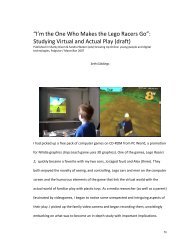Walkthrough: videogames and technocultural form - Seth Giddings
Walkthrough: videogames and technocultural form - Seth Giddings
Walkthrough: videogames and technocultural form - Seth Giddings
You also want an ePaper? Increase the reach of your titles
YUMPU automatically turns print PDFs into web optimized ePapers that Google loves.
concerns about videogame play’s apparent tendency to blur the distinctions between onscreen action <strong>and</strong><br />
everyday experience. It could be argued that such anxieties are not solely either simply mistaken or<br />
ideologically motivated, that instead they could be symptomatic of very real differences between ‘old’ <strong>and</strong><br />
‘new’ media, not least in relation to the distinct, ‘interactive’, modes of engagement with media images <strong>and</strong><br />
scenarios afforded by computer technology. Videogames do establish new, intimate, <strong>and</strong> literally cybernetic<br />
relationships between screen media, ‘consumers’, <strong>and</strong> digital circuits <strong>and</strong> networks, <strong>and</strong> do raise important<br />
questions about what is communicated, <strong>and</strong> how, in a medium that might more accurately be described as<br />
simulational than representational (see Part 3). On one level then (<strong>and</strong> without wishing to overstate the<br />
importance of the ill-in<strong>form</strong>ed <strong>and</strong> inaccurate accounts of videogame culture outlined so far) suspicions<br />
about the dangers of <strong>videogames</strong> may, inadvertently offer some analytical insight. They certainly highlight<br />
key binary oppositions <strong>and</strong> the ethical <strong>and</strong> cultural value systems constructed upon them, oppositions in<br />
which the commercial, the synthetic <strong>and</strong> the machinic are bad, the artistic, the natural <strong>and</strong> the human are<br />
good.<br />
virtual realism<br />
A particularly persistent binary opposition is that between the ‘virtual’ <strong>and</strong> the ‘real’. Videogames are a key<br />
exemplar of the perception that distinctions between the real world <strong>and</strong> mediated or simulated realms will,<br />
or have, collapsed. Depictions of violence become violence, ‘immersion’ in virtual worlds is actual oblivion in<br />
everyday media consumption, the compelling verisimilitude of videogame images – <strong>and</strong> the players’ ‘control’<br />
over them is the advent of an age of simulation <strong>and</strong> a fatal loss of the real. There is a remarkable congruity<br />
between some journalistic <strong>and</strong> theoretical discourses, the latter generally based in a reading of Jean<br />
Baudrillard’s work on simulation <strong>and</strong> hyperreality (Baudrillard 1983). An example of this is Andrew Darley’s<br />
book on popular digital screen media (2000) in which he sets out in detail a Baudrillardian dystopia in which<br />
<strong>videogames</strong>, alongside other digital media such as CGI special effects in popular film, herald a new era of<br />
depthlessness <strong>and</strong> loss of meaning. The Columbine shootings have already been mentioned, but perhaps the<br />
most persistent popular manifestation of this is commentary on the 1991 Gulf War. The thorough control of<br />
news media by the coalition states, <strong>and</strong> the spectacle of 'smart' weapons <strong>and</strong> video footage from missiles at<br />
their point of impact epitomised a popular notion of 'simulation' as a conflation of digital <strong>and</strong> video imaging<br />
technology <strong>and</strong> a sense of a remote, mediated experience (by both domestic audiences <strong>and</strong> Western<br />
military). This 'simulation' was explicitly figured in terms of video games, as General Norman Schwartzkopf’s<br />
phrase 'the Nintendo war' resonated across the news media <strong>and</strong> academic discourses (Sheff 1993: 285). Mia<br />
37




